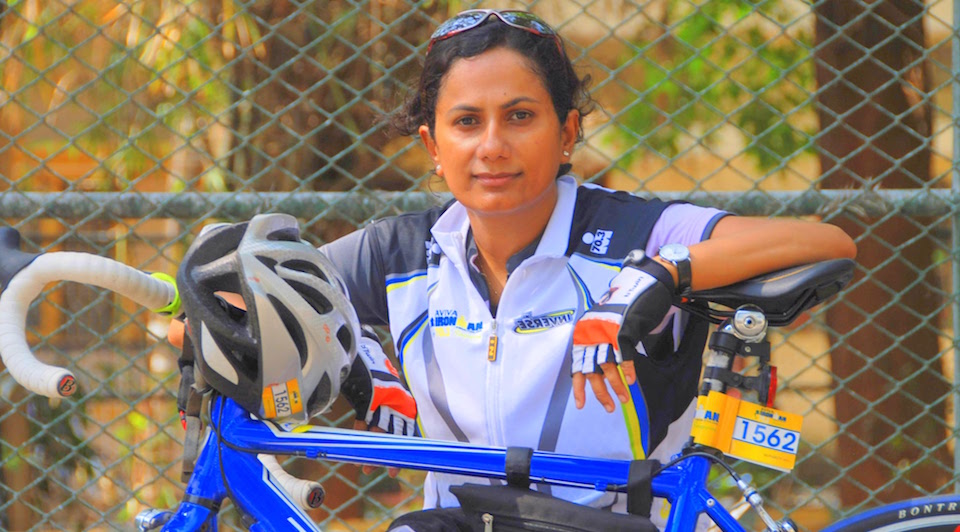
Ironman triathlete, cybercrime sleuth, tech entrepreneur: Manjula Sridhar is a lady of many hats. Photo credit: Peevee.
It was 8 a.m., which is early by event standards, when I walked into an IT firm’s hall in Pune, where Manjula Sridhar, founder of ArgByte Technologies, which tackles cybercrime, like online harassment, hacking, and spamming, was scheduled to give her talk.
She stood, all 5’3” inches or so of her, her curling hair cropped short, barely hiding her impatience, as people trickled in. She had a smile on her face, but there was also steel on her sharply cut features, as she said, “All late comers must pay hundred rupees (US$1.50) as fine.” And when people didn’t respond at first, thinking she was joking, the steel crept into her voice, “No, I’m serious!” And she grinned mischievously as grown-up attendees meekly deposited their fine on the table in front of her. After the talk, she returned the money to some of the young, college age, folks who had paid up.
The steel in Manjula’s persona was not surprising, neither was her sense of humor. She is an endurance sports enthusiast. She has cycled 600 km non-stop from Pune to Kolhapur and back in 30 hours. She is one of the few Indian women who took part and completed an Ironman 70.3 triathlon event, which includes 1.9 km swimming in the ocean, 90 km cycling, 21.09 km running, to be done in 8.5 hours. And she didn’t even know swimming when she registered for it!
But even before that, Manjula earned a black belt in karate during her school days. She’s also a mountaineer. Anyone who does an endurance sport knows it takes steely grit, or should I say Ironman grit, laced with liberal doses of humor, to pursue it – all traits that come handy when one dons the entrepreneur hat.
Her work in tech has won multiple awards – the Lucent Innovator Award, Bell Labs President’s Gold Award, and so on – and she has filed for several patents in wireless and network management.
Currently, a Fellow at Indian tech think tank iSPIRT and a mentor at Microsoft Ventures accelerator, Manjula is bootstrapping ArgByte. Her talk in Pune was to kick off iSPIRT’s ProductNation bootcamp for early stage startups.
See: Here seasoned founders make bulbs flash in the heads of newbies
The explorer in her

So who was Manjula Sridhar? An athlete? An entrepreneur? A cybercrime super sleuth? With such a multi-faceted personality, telling Manjula’s story becomes an exercise in, ‘where do I begin’.
She grew up in small towns of Karnataka, where her father, a government officer in the irrigation department, used to be posted. “There is a village called Mallat, in Raichur district of Karnataka, which is one of the most backward areas, where I studied up to class 7 in a government school,” she recalls.
Science and technology had fascinated her since her childhood.
I come from an academic background. From there to jumping into entrepreneurship, and creating a company, was itself a very big deal. And I survived.
“My father is an engineer and he used to subscribe to a science magazine which had DIY sections for kids. My brother, sister and I used to always try out the science experiments in it, like building a volcano, or making an akash butti [Indian paper lantern].”
Manjula graduated in electronics and communication engineering from the University of Mysore, where she topped her class. Her first job was at Bosch Telecom as software engineer. She went on to join Lucent Technologies/Bell Labs (now Alcatel-Lucent), which she quit in 2006 to set up a wireless security startup, Virefree.
Cashing out: the first startup exit
Virefree was incubated at IDG Ventures India, where she became an Entrepreneur in Residence. Her startup morphed into Aujas Networks, a security services company, with US$3 million in funding from IDG.
“Overall it was moderately successful,” says Manjula. “I say moderately successful because the product I had wanted to build didn’t get done. Instead, it turned into a services company.”
Services and products are two different ball games, Manjula explains. Services is all about sales and almost like body-shopping, whereas in products it’s about innovation. “Services was not something that I wanted to do – for me it had to be technology-centric.”
So, she sold her stake at Aujas.
On the whole, she counts it as a positive outcome that taught her a lot of new things. “I was a first-time entrepreneur in my family, there’s nobody who has done any sort of business. I come from an academic background. From there to jumping into entrepreneurship, and creating a company, was itself a very big deal. And I survived. So that was the good outcome.”
From the frying pan to the fire

Photo credit: Pixabay.
After she exited Aujas, Manjula took a year’s break, trying to figure out what she wanted to do. She looked at alternatives to the corporate world – non-government organizations, social firms, even something to do with sports.
“But the more I thought about it, the more I realized that technology is my first love – I mean, I can’t go away from technology.”
If you raise funding early, you lose control of your company.
Manjula has a masters from IIT Chicago, majoring in network security, graduating on the Dean’s list for academic excellence.
She knew so much about about security and networks that it made sense to do something in this field. She began exploring her options.
Earlier, she had started building a high-tech product, Ironsense, using anonymization, which allows computing on encrypted data.
This is how it works: Let’s say, there are five people and you want to calculate their average salary. Obviously nobody wants their salary figures public. So they submit it in an encrypted format. Ironsense has the ability to compute on that encrypted format to get the average, while the individual salary figures remain concealed.
Manjula took this idea to Silicon Valley, where she realized that building it up involved raising a large sum as funding. While discussing it with investors, she also realized that she didn’t want to take the Aujas route again. “If you raise funding early, you lose control of your company.”
Then the penny dropped

Photo credit: Kirankumar N.
Serendipitously, around this time she met Professor Saras Sarasvathy, a cognitive scientist, by chance. The professor advocates a new method of starting a business – the effectuation theory of entrepreneurship. “It hit me that this was the way to build a good company, and it made me understand where I had gone wrong with Aujas,” Manjula tells me.
If it’s a financial crime, they talk, but they are very scared about spilling their personal issues, especially if it involves girls.
Effectuation method, in a nutshell, is about not going into business with a preset goal in mind. If you hypothesize too much about your business, without customer feedback or real data, you will end up making wrong decisions. In the effectuation method, you deal with issues, solve problems, as you go along step-by-step, which is different from the causality method where entrepreneurs begin with an end in mind and create means to get to that end.
“Most VC-funded companies are built using the causality method. They predict a goal in, say, five years, and decide to put money behind it. And the money comes with all sorts of opinions from those funding it.” Manjula explains. “Suppose I build something and they decide that the idea will not generate enough returns, they will ask to shift into something else, which will generate the money they have in mind. So, basically you lose your independence as the creator of an idea.”
So, armed with the effectuation method, Manjula looked around for what she could do using her expertise in technology to make an impact on society. Online crimes affecting individuals who use the internet seemed to be a huge problem. She decided that she could use her know-how in network security and flip it to personal security online. Thus, ArgByte came into being.
The web of cyber crime

Photo credit: Pixabay.
Many of us spend huge chunks of our lives online. We shop, interact on social media, conduct business online, and so on. Computers, mobile phones, and the internet are a boon, but they also have given rise to a dark side – cybercrime.
There are criminal gangs out there right now, as you read this, targeting your computer, looking to steal money from you, or extract your personal details to commit an elaborate crime. This dark world has given rise to a whole dictionary of cybercrime lingo, such as spamming, hacking, phishing, spoofing, phreaking, trojan horse, malware, worm, spyware…Your bank account or credit card, email, facebook, and so on could get hacked. Or you could be a victim of online harassment, threats, or cyber bullying. ArgByte provides consulting and technological help to deal with such issues. In other words, if your online security is breached, you now have recourse to support on the website.
There is DIY information available on the ArgByte site which tells you how to deal with many common cybercrime attacks yourself. “What has happened these days is, people have a lot of technology in their hands, but they don’t understand it. It affects even techies: although they may know about some aspect of technology, many don’t know how to deal with problems like hacking. So there is a need for some sort of hand-holding in such situations,” says Manjula.
The US, India, China, and the Philippines – these are the four countries from where people come to ArgByte most.
ArgByte is also using the data it gathers to train machine learning algorithms, where the solution will then become automatic. People will no longer need personal hand-holding. “Ideally, an individual should be able to come to ArgByte, put their issue, and be able to get a resolution,” Manjula says.
The automated ArgByte personal assistant, Ironsense, is still in the future. “The software can be built, but I haven’t done it yet because I am bootstrapping. I want to reach a certain level, then take this along.”
Most of the visitors to ArgByte are from the US, because issues like impersonations, identity thefts, and so on are a big deal there. “The US, India, China, and the Philippines – these are the four countries from where people visit my site the most,” Manjula says
She gets a chunk of cases every week, but it has not gone to the level where she needs to raise funding. “This is a function of bootstrapping. I am not spending enough money on marketing, and at present, the traffic is all organic,” she says.
Where cops aren’t enough

Anonymous hacker via Wikimedia Commons.
One of the challenges in this business is making people open up about the cyber crime problems they face. If it’s a financial crime, they talk, but they are very scared about spilling their personal issues, especially if it involves girls. “That’s why the automated software will help, because there’s no personal involvement,” explains Manjula.
All I am saying is, I know this is a problem, and I am looking at technology as to how to solve it.
A lot of cases come through word of mouth, because many are hesitant to go to a stranger with sensitive personal issues. Most people don’t want to go to the police. In any case, the police are overburdened, and many of them don’t have the technological know-how to deal with high-tech cyber crime issues.
“Most people come to us via recommendation, because they are reassured that we are trustworthy, and will not misuse their data.”
ArgByte is a web-based product, and is still in the beta version. At present, people pay for the consultancy services Manjula and her team of assistants provide.
If you have a cyber crime complaint, you go to the ArgByte site, you can either message them, or book a slot that is convenient for you, and pay for it. It’s about US$25 for half an hour.
She could charge extra in certain cases. “It depends. If it’s a complex case where I have to spend a lot of time, then I will charge. But most of them I usually direct to the blogs already existing on our site, where they can follow the steps described, so that people don’t have to spend money unnecessarily.”
Manjula also provides pro-bono consulting to those who cannot afford to pay.
Google’s on it too
Jigsaw, a small subsidiary of Google, is taking on online trolling, using Conversation AI. Manjula has even shared details about Jigsaw on the ArgByte site. “Although in terms of what they’re trying to achieve, Jigsaw is similar to ArgByte, they’re sitting inside Google. They’re doing it at a global level, which is also required. I deal with helping issues faced by individuals,” explains Manjula.
Google’s Jigssaw is doing at a global level, which is also required. I deal with helping issues faced by individuals.
As for companies like Akamai and FireEye, they have business-to-business solutions, again not geared towards individuals, as ArgByte is.
“I am focusing on individual needs, which can also have a B2B application, provided they serve individuals.” She cites the example of Indian matrimonial sites, which are rife with fake profiles, which can lead to online fraud and harassment. “Obviously, they’re worried about their customers, and the people who are victims of such attacks also need assistance, which is where I can help out.”
India has overtaken the US, and is second only to China, in internet user base. This is largely due to the spread of low-cost smartphones, especially in rural areas. With the increase in internet users, also comes an increase in cybercrimes, hence the need for companies like ArgByte who are trying to mitigate the problem.
Here are more sobering statistics revealing the extent of the problem of cybercrime. According to PWC, economic cybercrime this year has gone up to the second place in terms of being the most reported crime. And it is escalating year by year, with increasingly advanced and sophisticated threats and schemes. According to India’s communications and IT minister Ravi Shankar Prasad, “more than 8,000 Indian websites were hacked in the first three months of 2016.”
“Cybercrime is not just an individual thing, it’s also a national concern – cyber wars are a reality,” adds Manjula. Indian defence minister Manohar Parrikar has admitted to cyber-attacks on the internet connections of some defence personnel.
I ask her about the social implications of cybercrime and Manjula says: “All I am saying is, I know this is a problem, and I am looking at technology as to how to solve it. As for the rest of it, civilization has to evolve and solve social problems. I am too small to make a dent there.”
This post The Ironman triathlete who will save you from criminals on the web appeared first on Tech in Asia.
from Tech in Asia https://www.techinasia.com/ironman-triathlete-manjula-sridhar-who-will-save-you-from-cybercrime
via IFTTT
No comments:
Post a Comment